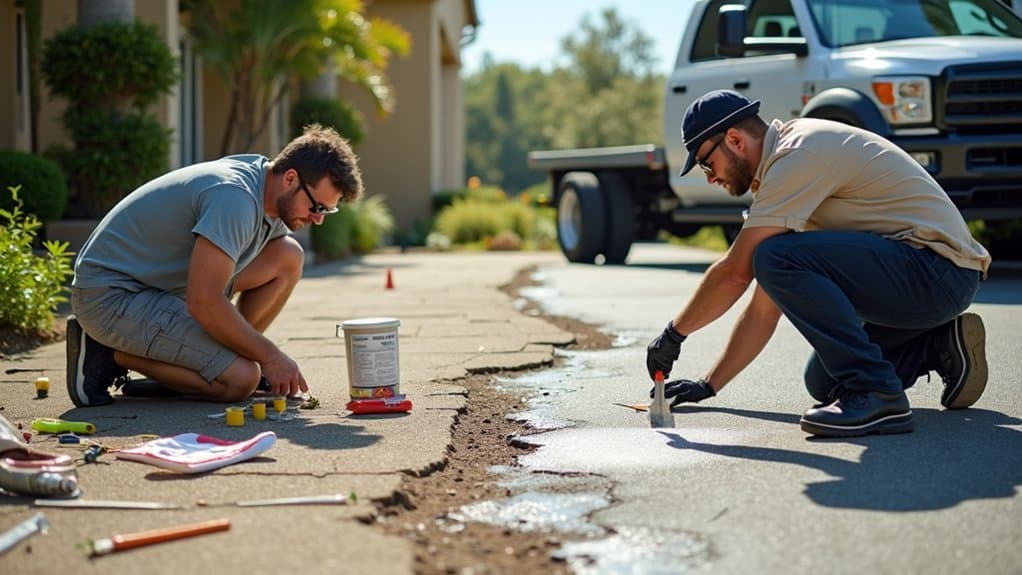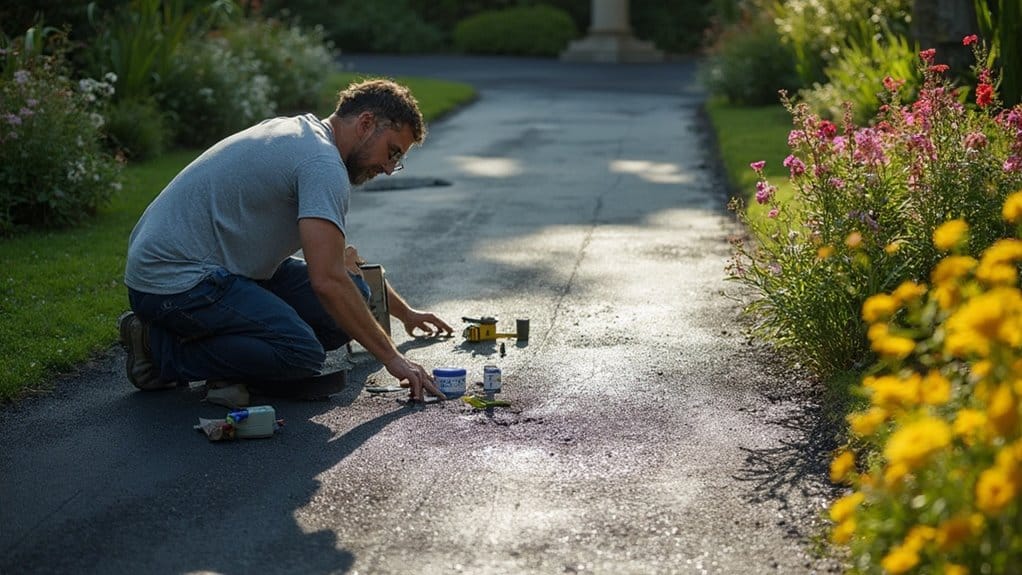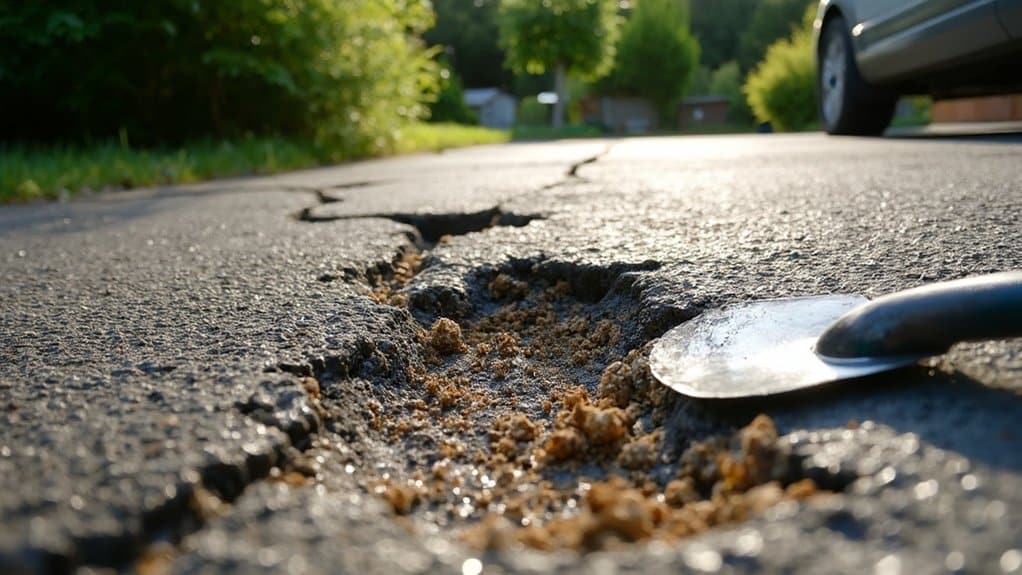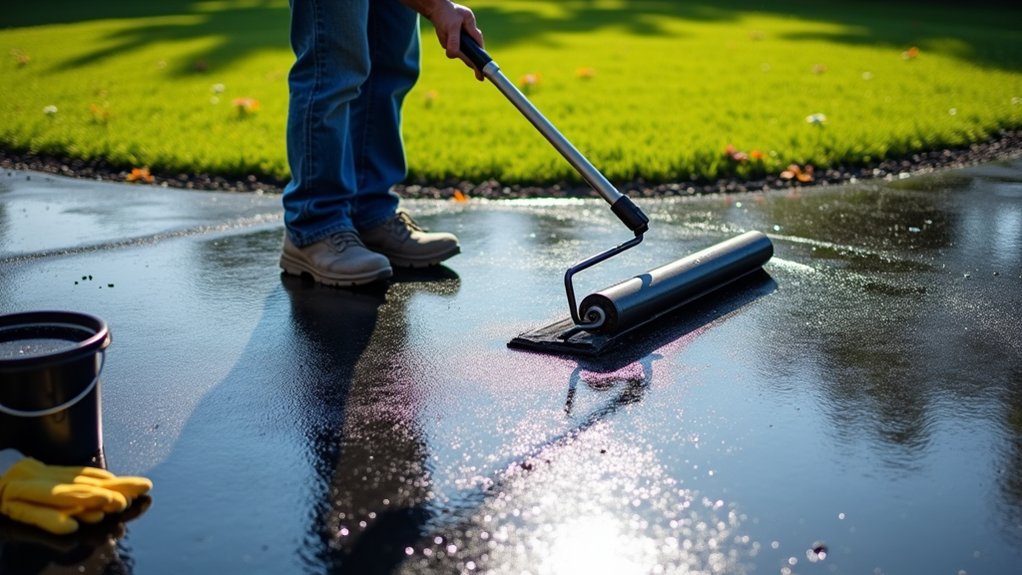When it comes to repairing cracks in your driveway, you have two main options: DIY methods or hiring a professional. For small cracks, simply clean the area and apply asphalt filler using a caulking gun. For wider cracks, you may need to use backer rods along with patching products.
While DIY can save you money, it might take more time and effort. On the other hand, professionals offer a comprehensive assessment and use high-quality materials, ensuring durability and safety. If you’re dealing with larger or more severe cracks, it’s often wiser to bring in an expert. Weigh your options carefully to achieve the best results for your driveway.
Table of Contents
ToggleKey Takeaways
- Identify Crack Type: First, assess whether the cracks in your driveway are active (continuing to widen) or dormant (stable). This helps in deciding the right repair method.
- DIY Repairs: For small cracks, use an asphalt crack filler available at most DIY stores. For cracks wider than 1/4 inch, insert backer rods before applying the filler for better results.
- Professional Assessment: Hiring a professional can be beneficial as they can detect underlying issues that may not be visible. They use high-quality materials that provide longer-lasting repairs.
- Cost Comparison: DIY repairs can set you back between £4 and £12 for materials. In contrast, professional repairs typically cost between £80 and £800, depending on the extent of the damage.
- Maintenance Matters: After making repairs, regular maintenance is crucial to prolong the life of your driveway and prevent new cracks from forming. Simple actions like sealing and cleaning can make a big difference.
Understanding Different Types of Driveway Cracks
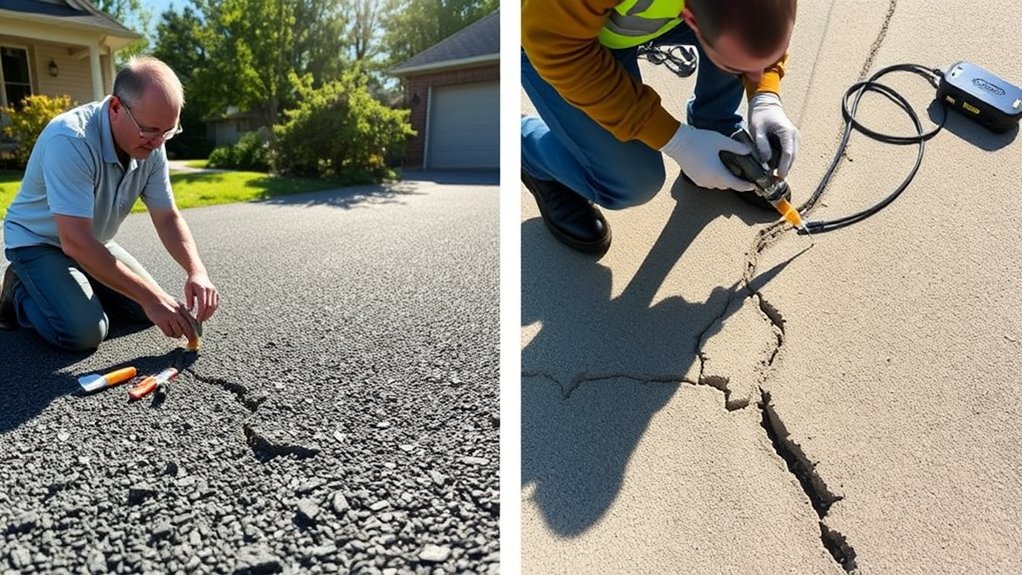
When assessing your driveway, it’s essential to recognise the different types of cracks, as each type points to specific issues.
Start by identifying the cracks: active cracks change over time, whereas dormant ones remain stable. Watch for patterns such as longitudinal, transverse, or hairline cracks. Each type reveals distinct causes, from thermal expansion to settlement during the curing process. For instance, edge cracking often occurs due to settling of underlying material, which can signal drainage issues. Additionally, poor drainage can lead to water accumulation, exacerbating crack formation.
Structural cracks are deep and wide, indicating serious foundation problems, while non-structural cracks, like crazing, are typically cosmetic.
Understanding these differences allows you to select the right repair methods. For minor cracks, a simple patch may do the job, but significant structural issues may require a professional assessment.
DIY Repair Materials and Techniques
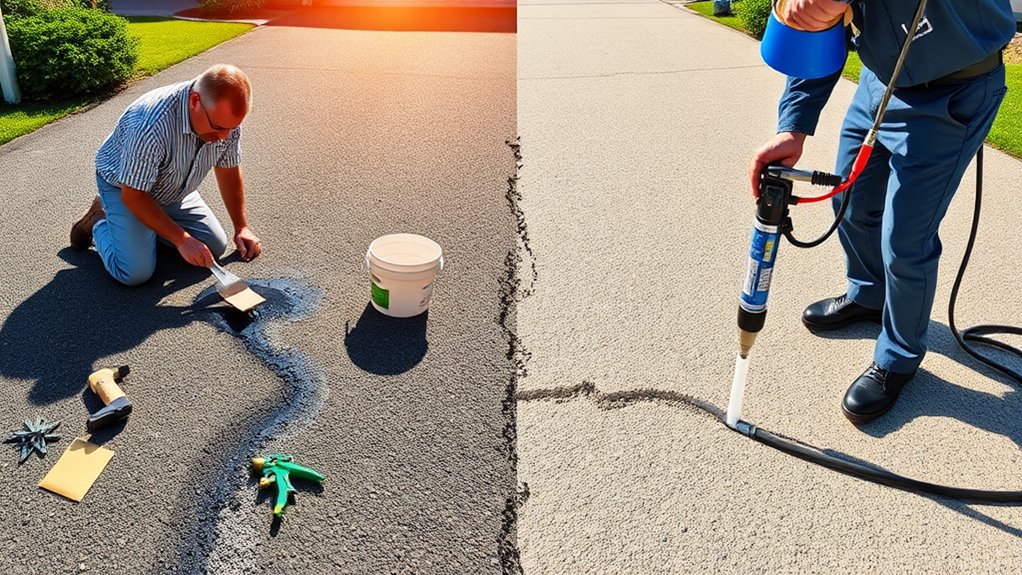
Repairing cracks in your driveway can be an easy DIY task if you have the right materials and techniques. Here’s how to do it:
- Prepare the Cracks: Clear out any debris and moisture. A screwdriver or wire brush works well for a thorough clean.
- Use the Right Materials: For small cracks, use asphalt crack filler with a caulking gun. For wider cracks, place backer rods before applying asphalt patch products. Filling gaps and cracks is essential for preventing further damage and deterioration.
- Smooth the Surface: After filling the cracks, level it off with a trowel. Make sure it’s slightly below the surface to allow for expansion.
Benefits of Professional Repair Methods
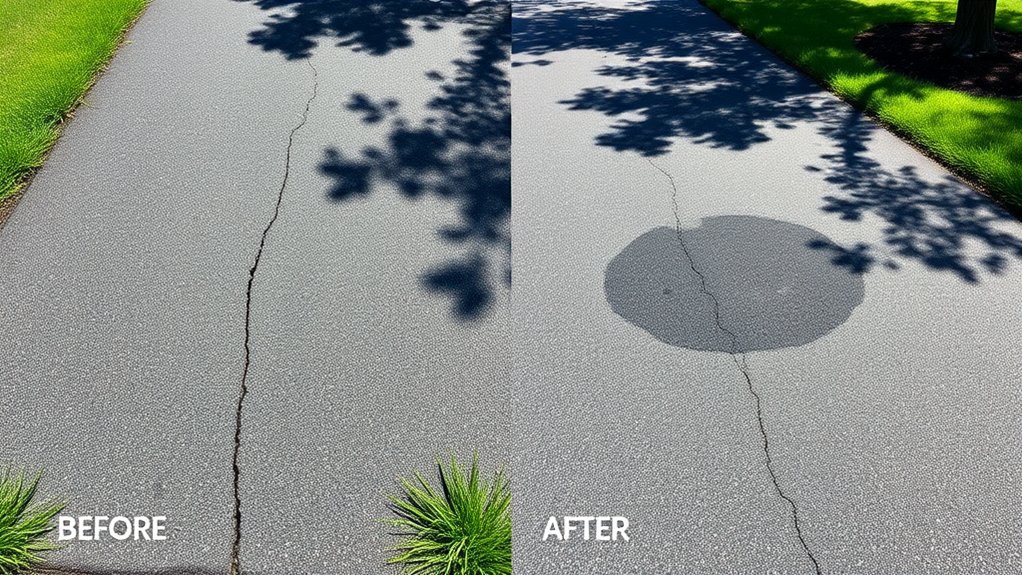
While DIY methods for repairing driveway cracks may seem appealing, opting for professional services offers significant advantages that can save you both time and hassle.
Professionals carry out a thorough assessment of your driveway, addressing any underlying issues to ensure a long-lasting repair. They use high-quality materials that not only protect against deterioration but also extend the lifespan of your driveway, ultimately saving you money by postponing expensive replacements. Additionally, their use of rubberized crack and joint sealant ensures a more durable and effective solution. Furthermore, ensuring a solid, crack-free sub-base is crucial for preventing future issues.
Moreover, professional repairs enhance safety by stabilising surfaces and preventing hazards that could lead to accidents.
These repairs not only improve the overall appearance of your driveway but also increase the value of your property.
With their specialised equipment and expertise, professionals can achieve results that DIY methods often struggle to match, giving you peace of mind.
Cost and Time Considerations for Repairs
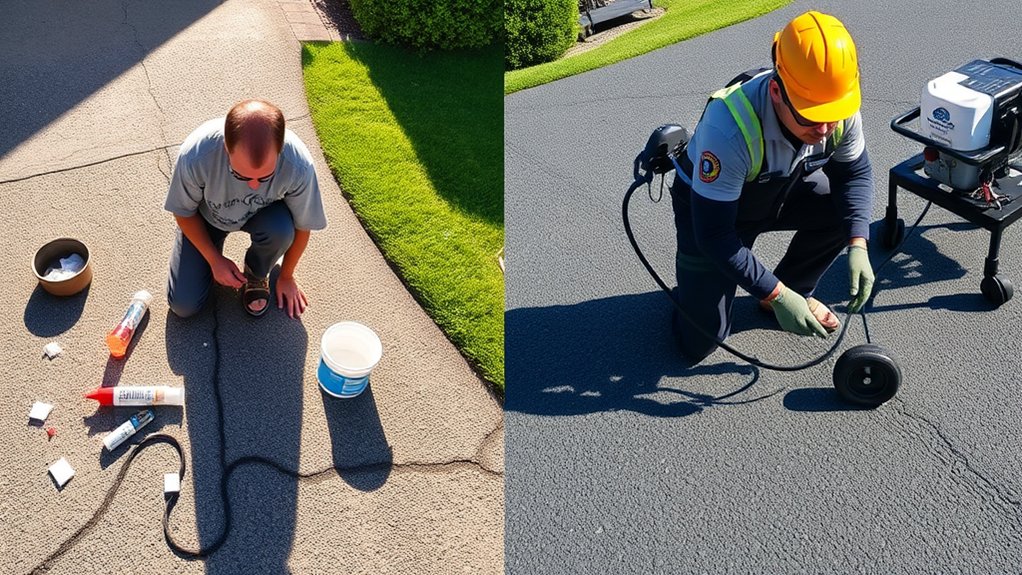
Understanding the cost and time involved in driveway repairs is crucial for making the right choice. Here’s a straightforward breakdown:
1. DIY Costs: Materials will set you back between £4 and £12, and you might need to hire equipment for about £60 a day.
However, be prepared to invest considerable time, especially for larger cracks.
2. Professional Costs: Hiring a professional will typically cost between £80 and £800.
While it may seem more expensive, this often includes warranties and guarantees of better durability.
3. Time Commitment: DIY repairs can take several hours for preparation and application, whereas professionals can usually complete the job within a few hours, allowing you to save time.
Additionally, ensuring proper installation quality can prevent future issues and extend the lifespan of your driveway.
Considering these factors will aid you in selecting the best repair method for your driveway.
Ensuring Durability and Safety Post-Repair
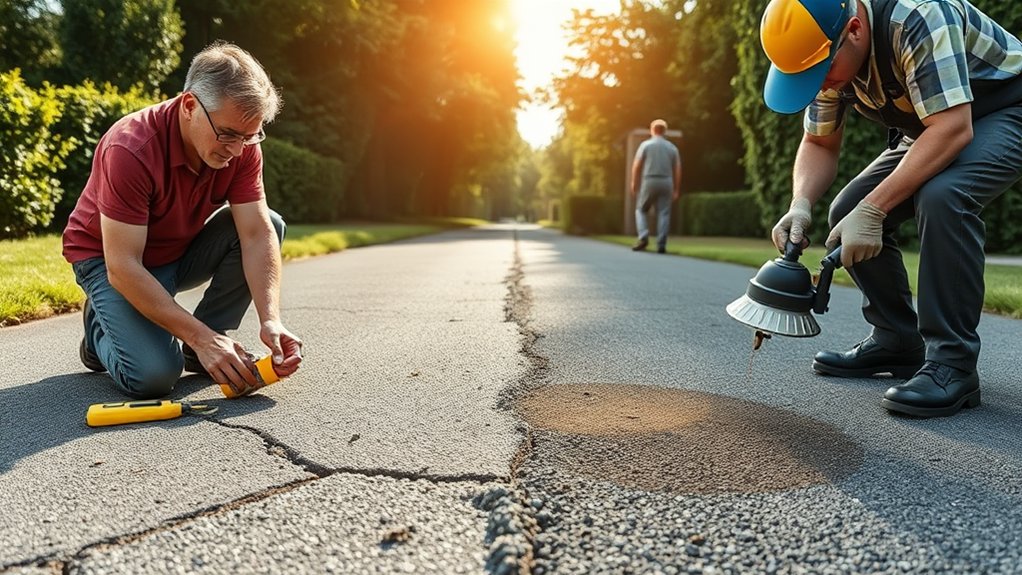
Once you’ve repaired your driveway, the next step is to ensure it’s durable and safe. Focus on achieving a strong bond between the repair material and the existing concrete to avoid early failure.
Opt for repair materials with a high polymer content, as these improve compatibility and bolster mechanical properties, helping to resist future cracks.
Consider techniques such as cross-stitching and using dowels to effectively distribute stress, which can enhance the longevity of your repairs.
Regular maintenance is crucial; it can significantly extend the lifespan of your driveway. Be mindful of environmental factors like moisture and temperature fluctuations, as these can impact durability.
Frequently Asked Questions
How Can I Prevent Driveway Cracks From Occurring?
To prevent cracks in your driveway, make regular inspections a priority and seal any early signs of damage. Pay attention to weather conditions, particularly temperature changes. Ensure proper drainage to guard against water pooling and the freeze-thaw cycle, which can exacerbate cracking. Regular maintenance can save you from costly repairs down the line.
What Tools Do I Need for DIY Driveway Repairs?
For DIY driveway repairs, you’ll need some essential tools. Make sure to have crack filler, sealing products, a caulk gun, and a wire brush for a clean surface. A pressure washer can also significantly improve your results.
Can I Repair Cracks in Winter?
Yes, you can repair cracks in winter, but ensure conditions are dry and warm. Use materials designed for cold weather to avoid further damage. Proper timing and preparation are crucial for a successful repair.
How Often Should I Inspect My Driveway for Cracks?
How often should you check your driveway for cracks? It’s recommended to inspect your driveway at least once a year, with additional checks after severe weather, like heavy rain or frost. By being proactive, you can avoid costly repairs and maintain the appearance of your driveway.
What Are the Signs of Serious Foundation Issues?
Signs of serious foundation issues include uneven floors, doors that stick, and stair-step cracks in walls. These symptoms suggest foundation settlement, which can jeopardise your home’s structural integrity. Don’t overlook these warning signs; seek a professional assessment promptly.
Conclusion
Can DIY repairs really compete with professional methods? While fixing small cracks yourself can save money, it’s crucial to consider long-term durability and safety. For larger cracks or more complex issues, investing in a professional service may be worthwhile. Ultimately, whether you opt for DIY or professional assistance, maintaining your driveway is vital for your home’s value and your peace of mind. A well-kept driveway makes a significant difference!
Knowing whether your tarmac driveway needs sealing can save you money, but there's much more to consider before making a Read more
Fixing common tarmac driveway problems is essential for longevity; discover the best strategies to address cracks, potholes, and drainage issues Read more
Keep your driveway looking pristine with our step-by-step guide to sealing, complete with pro tips that will transform your approach!

